Paris: Louvre Sketch: Reni Hercules II
 Wednesday, May 28, 2008 at 7:57AM
Wednesday, May 28, 2008 at 7:57AM "Hercules sur le bucher", 1619
Louvre, Paris
For posts 2006-2010
please visit
sadievaleri.blogspot.com
Sadie’s current site is at
SadieValeriAtelier.com
UPDATE February 1, 2021
I have recently discovered that unfortunately this Squarespace blog has failed to maintain most the images for older posts on this blog. Luckily, the original Blogger version is still live at sadievaleri.blogspot.com and all the posts and images from 2006-2010 are still visible there.
For my current artwork, teaching, and blog please visit Sadie Valeri Atelier.
 Wednesday, May 28, 2008 at 7:57AM
Wednesday, May 28, 2008 at 7:57AM  Tuesday, May 27, 2008 at 7:33PM
Tuesday, May 27, 2008 at 7:33PM  Tuesday, May 27, 2008 at 6:43PM
Tuesday, May 27, 2008 at 6:43PM 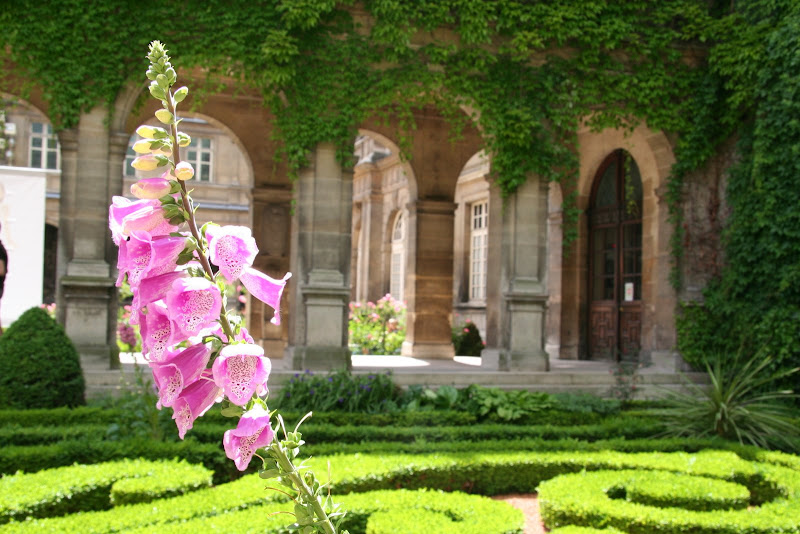 How is it I have never been to Musee Carnavalet before? It's a museum about the history of Paris, and I guess I was never interested before because I'd heard it was all in French. I just thought it would have a bunch of stuffy exhibits with long explanations in French.
How is it I have never been to Musee Carnavalet before? It's a museum about the history of Paris, and I guess I was never interested before because I'd heard it was all in French. I just thought it would have a bunch of stuffy exhibits with long explanations in French.
Turns out it's just a gorgeous gem of a museum. Starting with an incredible courtyard garden, it's an experience just to enter the beautiful scene. Even better, there was NO LINE at all, and on this particular day at least it was FREE. It felt like we'd stumbled on a secret museum!
Inside it's chock full of paintings of Paris, paintings in chronological order from throughout the history of painting. It was like a condensed tour of every era of French painting, but at a manageable scale, and all with Paris itself as the main subject.
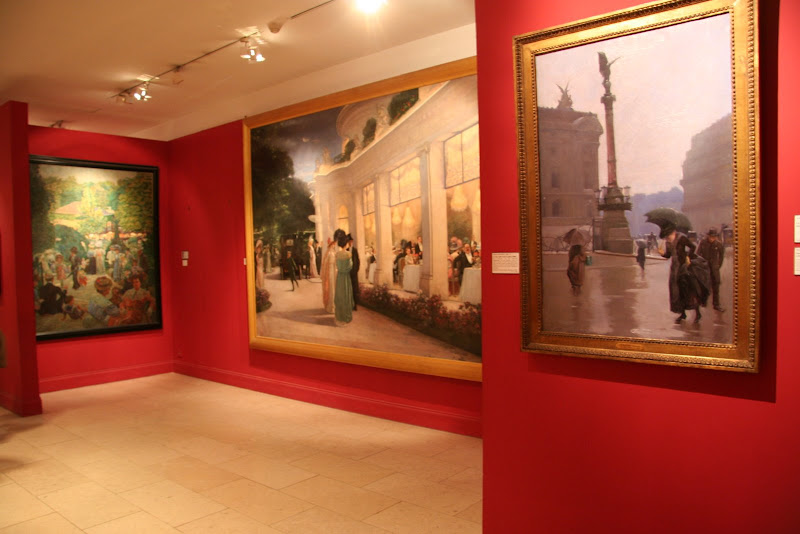 In addition to the paintings, there are amazing exhibits and models - models of the Guillotine, the Bastille (the armory prison which was torn down during the Revolution and so no longer exists), models of Notre Dame and other churches, and tiny models of medieval Paris herself.
In addition to the paintings, there are amazing exhibits and models - models of the Guillotine, the Bastille (the armory prison which was torn down during the Revolution and so no longer exists), models of Notre Dame and other churches, and tiny models of medieval Paris herself.
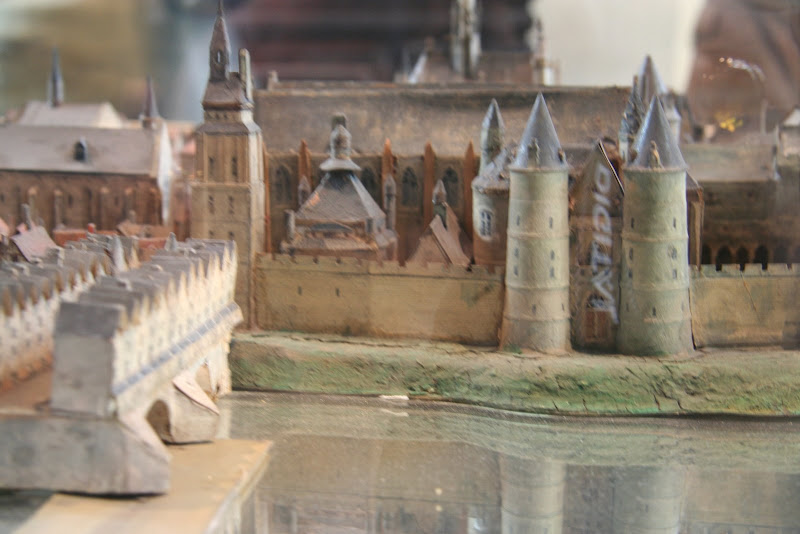 Because it's in two adjoining mansions and not in a huge museum building, we incorrectly assumed it was small. But after two hours we realized we had only seen the 16th century through the 18th century sections! There were still entire WINGS devoted to the Revolution, 19th century painting, and ancient, pre-Roman civilizations. We realized we'll have to come back again to really absorb it all. After three hours we were worn out, and we used our last shred of energy to buy the hardcover catalogue of the museum from the bookstore.
Because it's in two adjoining mansions and not in a huge museum building, we incorrectly assumed it was small. But after two hours we realized we had only seen the 16th century through the 18th century sections! There were still entire WINGS devoted to the Revolution, 19th century painting, and ancient, pre-Roman civilizations. We realized we'll have to come back again to really absorb it all. After three hours we were worn out, and we used our last shred of energy to buy the hardcover catalogue of the museum from the bookstore.
The best part about getting worn out in Paris is.... there's always a cafe nearby to recuperate in!
 Tuesday, May 27, 2008 at 5:59PM
Tuesday, May 27, 2008 at 5:59PM One of my favorite things to do while traveling is track down little off-the-beaten path places. l'Oisive The is a tea house I read about on a blog a few weeks ago. I had never explored this particular neighborhood called La Butte aux Cailles and I am always looking for new places to love in Paris, so we launched out in the light rain, arm in arm under Nowell's umbrella.
I was thrilled when the tea house was even better than expected - it's quiet and cozy, and the owner is a friendly American woman. I have to say, after 6 weeks in Paris it was really nice to order in English! Nowell and I sampled some of the homemade treats, I had an amazing scone hot out of the oven, and the first one was so good I ordered a second right away. We shared a big pot of Lotus Royal tea, steeped with a large sachet hand-tied around the top of the teapot. The combination of the tea, the gentle rain outside, the soft downtempo music and decor of charming flowered tablecloths put us in a happy mellow mood.
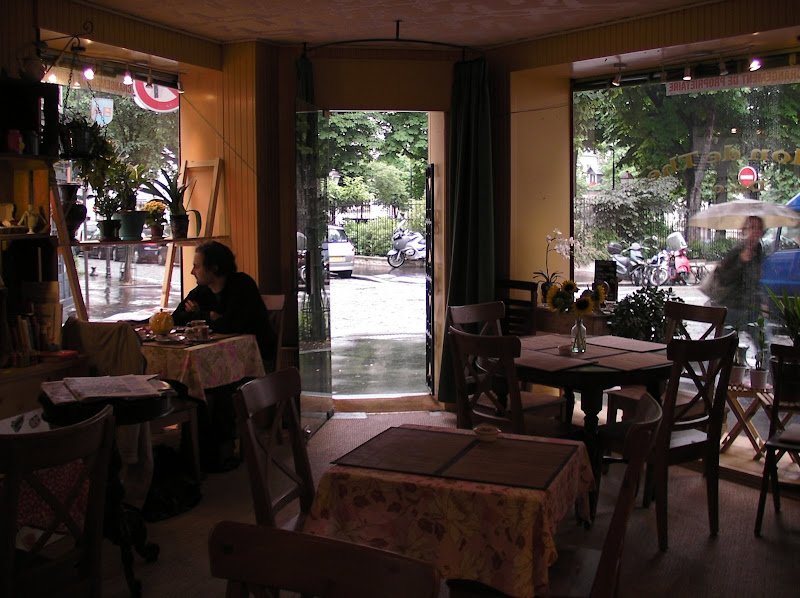
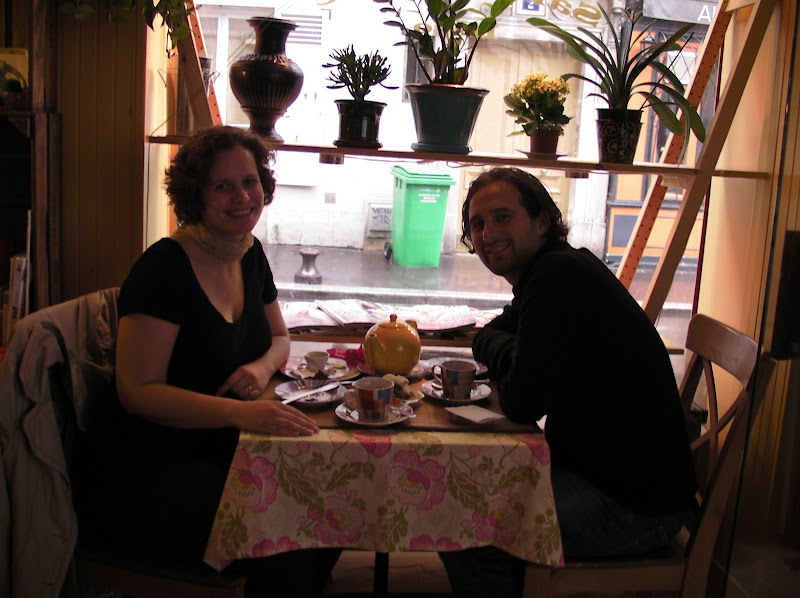 The neighborhood is a real find too. It looks like a little village with cobblestone streets, bistro restaurants, tiny markets, and dotted with people walking small dogs and parents walking their small children home from school.
The neighborhood is a real find too. It looks like a little village with cobblestone streets, bistro restaurants, tiny markets, and dotted with people walking small dogs and parents walking their small children home from school.
 Monday, May 19, 2008 at 5:25PM
Monday, May 19, 2008 at 5:25PM 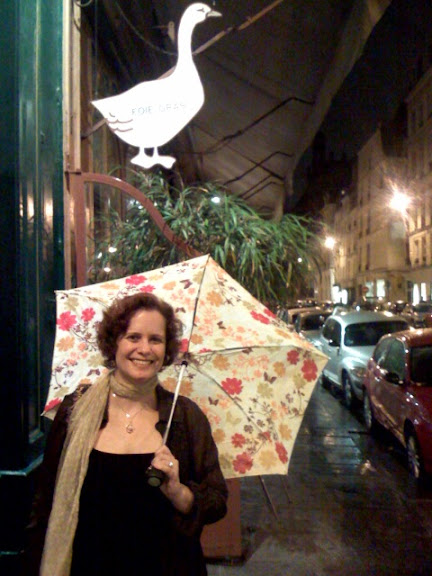 Nowell and I found a restaurant the specializes in fois gras dishes - heaven! This is me under the sign after we ate there (sporting my stylish new Parisian parapluie/umbrella).
Nowell and I found a restaurant the specializes in fois gras dishes - heaven! This is me under the sign after we ate there (sporting my stylish new Parisian parapluie/umbrella).
More art coming soon..... my plans to paint in the Luxembourg gardens have been delayed by rain, but the sun is scheduled to shine again later this week.
 Friday, May 16, 2008 at 6:58PM
Friday, May 16, 2008 at 6:58PM I love this painting, how the ribcage feels like a heavy living mass of bone and connective tissues, sagging and stretching within a flexible network of skin and muscle barely holding everything together. The pelvis and ribcage are resenting their connection by the spine, each urging towards their own expression. The belly is only an afterthought, no intention of its own, merely subject to other forces. The limbs are all secondary, the gesture is complete in the torso.
 Thursday, May 15, 2008 at 1:34PM
Thursday, May 15, 2008 at 1:34PM  Wednesday, May 14, 2008 at 1:13PM
Wednesday, May 14, 2008 at 1:13PM Nowell recreated a picture we took six months ago at Philadelphia's Rodin Museum:
 Tuesday, May 13, 2008 at 1:27PM
Tuesday, May 13, 2008 at 1:27PM  Friday, May 9, 2008 at 2:54PM
Friday, May 9, 2008 at 2:54PM Unfortunately my unhealthy Paris lifestyle has caught up with me and on this, my first free weekday in Paris without art class, I am stuck home with a "mal au gorge" (sore throat) and a small fever, seemingly working it's way along towards a head cold and maybe even laryngitis. Zut alors!!! Hard to speak French when you can't speak at all!
In San Francisco I am very healthy - I exercise a lot and eat low-carb/high protein/high fiber every day, I go to bed early and get up after a full 9 hours of sleep, never drink caffeine, and I haven't been sick in a long long time. But here in Paris, I stay up late, consume croissants and chocolate and coffee as much as possible, and drink wine at LUNCH of all unhealthy habits (well, I admit I drink a lot of wine in the US, too, but rarely at LUNCH). After all that abuse, I guess I deserve to get sick. Let's hope my little rheum/cold doesn't get worse, because my husband arrives Sunday and I want to greet him at the airport looking spiffy!
Anyway, I've spent my sick-ey afternoon online, catching up on all my favorite Paris blogs and bookmarking all the places they mention that I plan to visit once I am healthy again. So I thought I'd share some of my favorite bloggers.
First off though, I have discovered something extraordinary about Google Maps. As if I didn't already have much to love about Google, they went and made their maps customizable. Yes, you can put your own pushpins on the map with your own notes, you can plan routes and share your saved maps with friends. What riches!!!
On my own Paris 2008 Google map I've marked everything from the bank ATM's that don't charge me a fee to restaurants and all the little gems of Paris I plan to visit. I can even plot a walking route and find out it is 3,216 feet from the exit of the Louvre to Le Souffle restaurant, where Dad and Andrew and I dined the other day.
How to Make Your own Google Map
Go to maps.google.com and click the little orange tab under the Google logo (I bet you've never even noticed it) which says... "My Maps". Oh la la!! From there you can save locations and mark routes and edit them to your heart's delight. (Yes, my friends and family think I am a bit obsessive about planning vacation details as I have been known to make elaborate travel maps in Adobe Illustrator... but if Google has gone to the trouble of offering this functionality, I can't be alone in my obsession, can I?) Anyway, moving on....
My Plus Favorite Paris Blogs
Polly Vous Francaise is written by a charming American expat who shares so many of my tastes I am sure she and I would be fine friends if we met.
I Prefer Paris is written by a fabulous American expat in the Marias who shares many hidden secrets of Paris and even offers guided tours.
Paris Breakfast is one I discovered back when I was doing A Painting a Day and have loved following along with her little watercolors of her various marvelous petit dejeuners in Paris ever since. What's not to like about a blogger who loves Paris and breakfast and painting as much as I do?
King Nigrito is a cute mystery man, 23 cm tall and made of leather and resembling a mouse (maybe?). He gets around and has photos of himself at his favorite spots. Very useful for me, as he happens to haunt my adopted arrondissement/neighborhood and the day after one of his posts you can reliably find a very quiet 30-something American woman in hat or scarf or both, trying not to look or sound too American, testing out King Nigritos' very seat and surreptitiously making notes in her Moleskine Paris Guide.
(You don't know what a Moleskine City Guide is? Get one now!!!)
Ok, enough blogging for today. I'm going to make some tea and watch Paris channel 135, which according to my Dad's husband Andrew has old American classic movies subtitled in French. Magnifique!!
 Friday, May 9, 2008 at 8:41AM
Friday, May 9, 2008 at 8:41AM Here's a slideshow of the stages of the drawings
I had critiques with both Tim and Michelle. Their comments were really helpful and give me a lot to work on for my future drawings:
I need to think about "packing the form" - the human body is made of irregularly shaped packed forms arranged on curves. I need to remember to define the top edges of those forms, the edges facing the light, as much as the bottom edges, the edges facing away from the light.
Also, in both these drawings I've over-modeled in the light. All the darkest shadow is on the side of the model turned way from me, so almost everything I saw was in the light. In my zeal for modeling form I made everything too dark.
I also need to practice seeing the forms arranged in fans arcing off of changes of direction on the contour.
Finally, I need to emphasize structure and solidity, otherwise my approach with soft gradation tends to look too wispy. I agree. I am not interested in making pretty drawings, I want to make strong drawings.
Not only have I learned a lot about drawing from this workshop, but also my expectations for myself have been raised in the process. I have a vision for how well I will someday be able to draw, a vision for how I could draw with a lot of practice and investigation, and it's far more developed than I ever expected of myself before.
 Wednesday, April 30, 2008 at 4:17PM
Wednesday, April 30, 2008 at 4:17PM This is a drawing of a 6-hour pose. Yesterday for the first half I focused on the inner movement curves, the block-in, and finally the detailed contour. Tim and Michelle are teaching us to think of the contour three-dimensionally. So I am thinking of the contour wrapping around the body, moving towards and away from me.
I've taken my drawing into Adobe Illustrator and used the software to recreated my original inner movement curves to diagram the process I am learning:
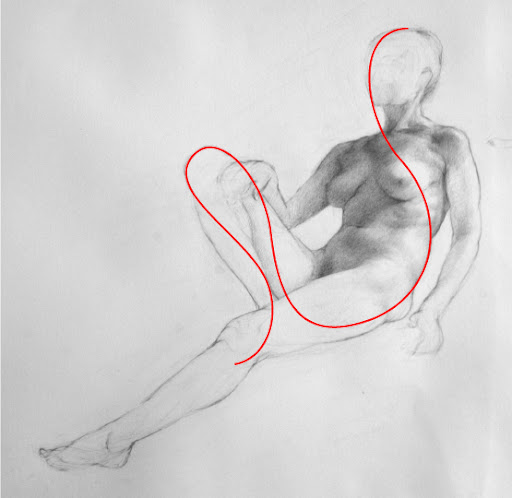 As Tim teaches the technique, we draw three interrelated movements:
As Tim teaches the technique, we draw three interrelated movements:
We start with the theme, which is the fundamental inner movement curve. The theme starts at the crown of the head, and flows down the center line of the face, down to the big toe of the standing leg, or the leg holding the most weight.
This is a precise curve, it describes specific points on the body and the relationships between these points. (In contrast to simply "expressing" the movement. This is a record of what we see and know about the body, it's not exaggeration or expressionism.)
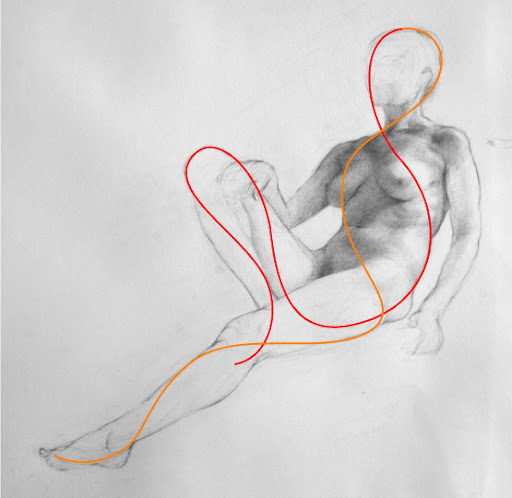 The second line we draw (above) is the countertheme - the orange line. It's a secondary inner movement curve that travels from the top of the head, wrapping around the body the opposite direction and down the non-standing leg.
The second line we draw (above) is the countertheme - the orange line. It's a secondary inner movement curve that travels from the top of the head, wrapping around the body the opposite direction and down the non-standing leg.
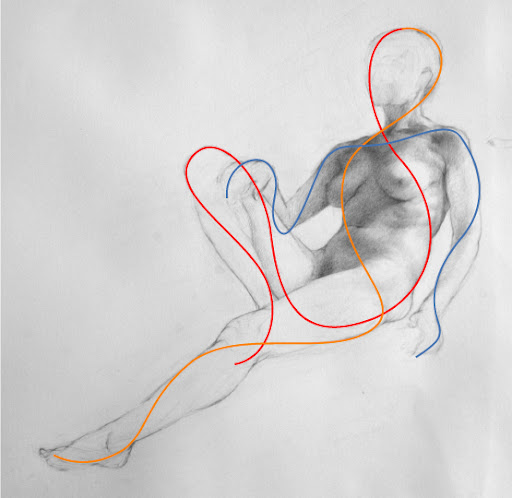
Third, we draw the ornament (above). This is the third interrelated movement. As with the theme and countertheme, the ornament wraps around the forms, moving side to side and back to front.
 All of the curves wrap around the body three dimensionally. Above is the same countertheme curve, but I've created dotted segments to show where I am imagining it wrapping around the back side of the form. (I do not modify the figure to fit these curves, it's amazing the interrelations it's possible to see once you start looking this way.)
All of the curves wrap around the body three dimensionally. Above is the same countertheme curve, but I've created dotted segments to show where I am imagining it wrapping around the back side of the form. (I do not modify the figure to fit these curves, it's amazing the interrelations it's possible to see once you start looking this way.)
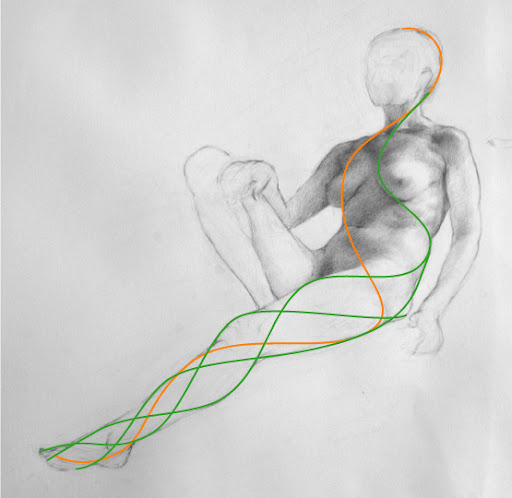 Above I've shown how adding more and more interrelated movement curves begins to describe the form. As I get more and more detailed with my contour line, I can see how every form on the body follows this wrapping helix pattern.
Above I've shown how adding more and more interrelated movement curves begins to describe the form. As I get more and more detailed with my contour line, I can see how every form on the body follows this wrapping helix pattern.
It's interesting to recreate the curves in Adobe Illustrator. The program creates Bezier curves that have a certain mathematical tensile force, and you have to learn to manipulate them to create flowing curves without awkward bends. The behavior of of Bezier curves is amazingly conducive to the Inner Movement Curves - it was shockingly easy to recreate the curves with the software. I have a feeling there is an implicit relationship between the cohesive, efficient, and functional forms of the body and mathematical curves.
Update added 5/03/08
Bezier was a 20th century French draftsman! Wikipedia has a great entry on Bezier curves, and near the bottom of the page you can see elegant animations for how Bezier curves are calculated.
After spending so much time on the contour, I moved on to the tonal value shading. I was surprised how quickly the value study progressed. I think learning the contour with this method gives me a deep understanding of the three dimensional figure, so flowing the light across the form is easier.
I'll end with a quote from Tim:
 Wednesday, April 23, 2008 at 5:56PM
Wednesday, April 23, 2008 at 5:56PM  Afternoon Pose, pencil on paper
Afternoon Pose, pencil on paper
I'm practicing drawings based on the "inner movement curve" method in my class at Studio Escalier, and today I really felt something click.
This drawing feels more solid, more believable than my previous drawings. I feel like I am suddenly seeing the relationships between all the parts as a whole, and feeling the three dimensionality of the pose. It has everything to do with what I studied with Ted Seth Jacobs, but Tim Stotz's emphasis on movement is making Ted's teachings come together for me. (Tim was a student of Ted's, so no wonder).
The drawing above started with this drawing of the interior lines of movement:
Next I started fleshing out the drawing, starting with the legs and drawing more and more inner movement curves to create the full line drawing. The outside curve of the knee has everything to do with the interior angle of the ankle. Everything wraps around and appears again in a logical place.
Once I started seeing all the relationships it became like a treasure hunt to find more. They are everywhere, all the way out to the fingertips and I am sure down to the tiniest tissue structures.This is my drawing of a 30-inch marble sculpture by Dumont, done in 1712. It was in a room full of similar small-scale sculptures, which Tim explained were the final thesis projects which students of the 18th century French sculpture academy had to submit in order to graduate and go on to be professional sculptors. These small works represent the pinnacle of the art of figurative sculpture.
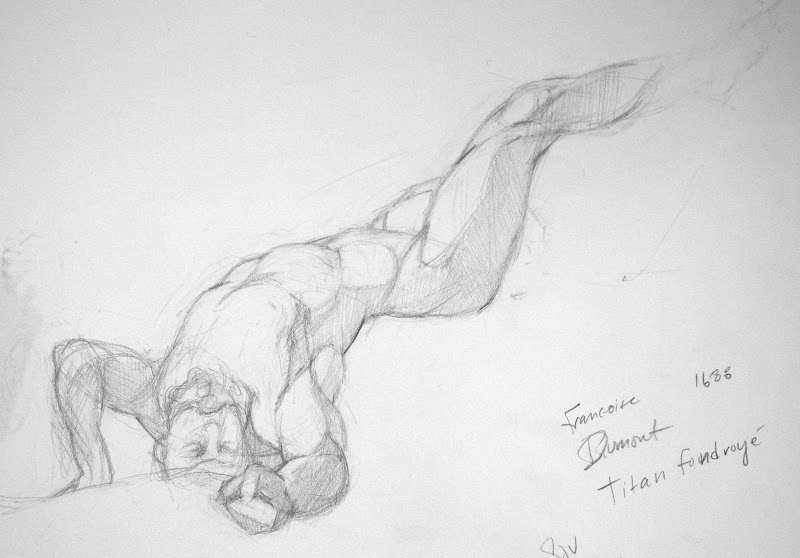 The figure has a clenched fist thrust directly at me... I don't know why I choose such a difficult view. But it made me interested to do more hand studies.
The figure has a clenched fist thrust directly at me... I don't know why I choose such a difficult view. But it made me interested to do more hand studies.
By the way, the Louvre website is amazing. I just found out you can browse the entire collection, room by room. I found the room we were drawing in today here.
 Tuesday, April 22, 2008 at 5:15PM
Tuesday, April 22, 2008 at 5:15PM Tim Stotz has us focusing on "inner movement curves" to establish the proportions, instead of using the straight-line block in. Also, we are doing 5-minute to 2-hour drawings. Both are very foreign to me after a year if doing 20-40-hour block-in drawings. But it's a good approach for me to practice and I'm enjoying a more responsive and less analytical way to draw.
 Friday, April 18, 2008 at 3:19PM
Friday, April 18, 2008 at 3:19PM I arrived yesterday and until a few hours ago it was mostly tedious and boring, dealing with getting a functioning local cellphone and accessing the internet in my apartment which both required trips to several locations in the city to buy wires (NEVER travel without an ethernet cable!!!) and special parts to make the phone work. I learned that the French word for ethernet cord is......... "ethernet cord". On the plus side, it gave me many opportunities to parle en francaise with the natives, and everyone replies to me in French, so even though I never learned any grammar and have forgotten what miserable shreds of tense conjugation I once had, I think I am successfully speaking French.
There were a few brief moments last night and today when I felt like I was in Paris - crossing the Seine over an uplit bridge as I walked home after dark last night, catching my first glimpse of that special tower which holds rank as the world's favorite keychain fob. But mainly it's been a maze of hunting down the closest Monoprix grocery store and returning to my apartment to repeatedly enter a 30-digit passcode into what I have come to believe is an imaginary "wireless" connection. Thus the cord.
But eventually I got myself trussed safely back into the various virtual networks I need to feel sane (and connected to my painfully far away husband) and finally I was able to relax and start feeling the Paris vibe.
And now I'd like to sing the praises of Monoprix.... a store that is the prettiest, most compact and city-fied Walmart you'll every see. I bought a travel sewing kit, asparagus, kelloggs brand cereal, a grid-ruled notebook, proscuitto, and a polka dot scarf, among other things. If I were so inclined I also could have bought baby girl dresses, plastic picnic ware, a sack of croissants, and the entire Neutrogena line of skin care products. I restrained myself, at least for now.
When the groceries were put away in my microscopic fridge I went to a cafe around the corner for dinner and and despite the goofy dancing tomato logo on the awning the food was divine: I had "veau" which I need to look up because I don't even know what kind of meat I was eating, but it was sooo good, tender meat on a t-bone with a creamy sauce. Had that along with a carafe du vin bordeaux and finished it all off with mousse au chocolat which unexpectedly had little chips all over the top which at first I thought were chopped nuts but turned out to TOFFEE and wow... if there is ever a proper topping for chocolate mousse it is little bits of toffee.
So, now I feel like I am here :)
Oh, and the apartment I rented is just lovely - artsy and quirky as only the french can manage, the owner has decorated with tiny antique chests and huge gold-framed mirrors paired with modern reflective tile in the bathroom and kitchen, with pickled white hardwood floors throughout. Very cute, very eclectic. Buddahs and framed oil paintings and weird little lamps on doilies abound. And a tiny 6-inch window above the bed, just big enough to crack open and let in a tiny whiff of damp Paris nighttime air, the best air on the planet in my humble opinion.